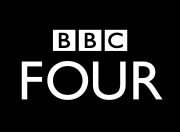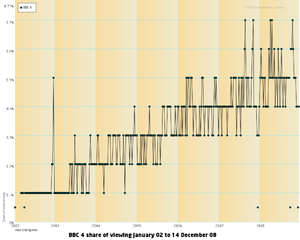BBC Four
| BBC Four | |
|---|---|
 |
|
| BBC Four logo | |
| Launched | 2 March 2002 |
| Owned by | BBC |
| Picture format | 16:9 SDTV |
| Audience share | 0.5% (September 2009, BARB) |
| Country | United Kingdom |
| Replaced | BBC Knowledge |
| Sister channel(s) | BBC One BBC Two BBC Three BBC News BBC Parliament BBC HD |
| Website | www.bbc.co.uk/bbcfour |
| Availability | |
| Terrestrial | |
| Freeview | Channel 9 |
| Satellite | |
| Freesat | Channel 107 |
| Sky | Channel 116 |
| Astra 2D | 10773H 22000 5/6 |
| Cable | |
| Virgin Media | Channel 107 |
| UPC Ireland | Channel 117 |
| UPC Netherlands | Channel 806 |
| Ziggo (Netherlands) | Channel 53 |
| Telenet (Belgium) | Channel 566 |
| IPTV | |
| TalkTalk TV | Channel 20 |
| Internet television | |
| BBC Online | Watch live (UK only) |
| TVCatchup | Watch live (UK only) |
| BBC iPlayer | Watch live (UK only) |
BBC Four is a television network of the BBC available to digital television (Freeview, IPTV, satellite and cable) viewers in the United Kingdom. BBC Four launched on 2 March 2002[1] being the successor to BBC Knowledge, evolving from its last schedule consisting mainly of documentaries. BBC Four transmits from 19:00 to 4:00. On Freeview it time-shares with CBeebies.
It shows "a wide variety of programmes including drama, documentaries, music, international film, comedy and current affairs ... an alternative to programmes on the mainstream TV channels."[2]
BBC Four has an annual budget of £53.5m [3]. It has a schedule dominated by repeats but is required by its licence to broadcast at least 100 hours of new arts and music programmes each year[3].
Contents |
Programming
The first evening's BBC Four programmes were simulcast on BBC Two[1]. BBC Four is notable for first showing Larry David's Seinfeld follow-up, Curb your Enthusiasm[4], Armando Iannucci's cutting political satire, The Thick of It, The Chaser's War on Everything and Flight of the Conchords.

The channel broadcasts a mixture of art and science documentaries, vintage drama (including many rare black-and-white programmes), and non-English language productions such as films from the Artificial Eye catalogue, the French thriller Spiral and the Swedish detective series Wallander[5]. BBC Four further supports foreign language films with its annual World Cinema Award which has been running since 2004.
On weekdays at 19.00, the channel shows a 30-minute global news programme called World News Today, simulcast with and produced by BBC World News. It screens a number of documentaries such as The Century of the Self and The Trials of Henry Kissinger. The channel is also home to many political travel shows such as Holidays in the Axis of Evil which features investigative journalism.
Drama has given the channel some of its most popular programmes, with The Alan Clark Diaries (2003) and Kenneth Williams: Fantabulosa! (2006) being among the highest rated, with over 800,000 viewers. The 18 March 2008, broadcast of The Curse of Steptoe brought the channel its highest audience figures, estimated as 1.41 million viewers, a 7% share of multichannel audiences between 9pm and 10.05pm, based on overnight returns.[6] The official audience figures for the broadcast, including time-shifting, were later published as 1,625,000.[7] Another notable production was a live re-make of the 1953 science-fiction serial The Quatermass Experiment, adapted from the original scripts into a single, two-hour version (though on the night it in fact underran considerably, lasting less than 1 hour 40 minutes), broadcast on the evening of Saturday 2 April 2005. Discounting BBC Four's previous live relays of theatrical Shakespeare productions, this was the first live made-for-television drama to be broadcast by the BBC for twenty years.
Another notable programme broadcast on BBC Four is Charlie Brooker's Screenwipe it contains reviews of current shows, as well as stories and commentary on how television is produced. The show is presented by broadcaster Charlie Brooker.
According to BARB the comedy panel game QI has the highest ratings of any show on BBC Four.[8]
At the Edinburgh International Television Festival, BBC Four won the Non-Terrestrial Channel of the Year award in 2004 and 2006.
On the Freeview digital terrestrial television platform, BBC Four is broadcast in a statistically multiplexed stream in Multiplex B that timeshares with the CBeebies channel; broadcasting from 7 pm to about 4 am every day.
On-screen identity
The channel's initial series of idents were generated dynamically reflecting the frequencies of the continuity announcers' voice or of backing music and were designed by Lambie-Nairn. As a result, no two idents were ever the same.
When the channel first started airing, it used the slogan "Everyone Needs A Place To Think", but the BBC stopped using this several months after the launch. However the BBC Four logo and above slogan can be found, engraved on benches along the South Bank in London, between the London Eye and Waterloo Bridge.
In September 2005, the channel began showing new idents based on the theme of a "four" and optical illusions, for example, a swimming pool where a person on an inflatable ring appears in the bottom left corner, though ripples don't enter the remaining quarters. Although the image appears as one at the start of the ident by the end it is clearly four separate images.
Controllers of BBC Four
BBC Four and BBC Two
Since the launch of BBC Four, the BBC has been accused in particular of shifting its more highbrow output to the new channel, which a minority (12% in the second quarter of 2008)[11] of viewers do not receive. The perceived strategy has been to allow BBC Two to show more popular programmes and to secure higher ratings. Many commentators have judged there to be a strong resemblance between the new Four and the earlier, more ambitious, BBC Two.[12] Output from BBC Four (documentaries rather than foreign films) was for a time repeated on BBC Two in a 'BBC Four on Two' branded area, although this was often in a late night broadcast slot after Newsnight and has been discontinued.
See also
- List of documentary channels
- BBC Four World Cinema Award
References
- ↑ 1.0 1.1 "Culture, controversy and cutting edge documentary: BBC FOUR prepares to launch", BBC Press Office, 14 February 2002. Retrieved 2010-04-02.
- ↑ "BBC - BBC Four - FAQ". http://www.bbc.co.uk/bbcfour/faq/. Retrieved 2007-08-19.
- ↑ 3.0 3.1 BBC Four Service Licence. Issued May 2009 Retrieved 12 March 2010
- ↑ Burrell, Ian (15 February 2010). "The Independent - Watch and learn: BBC Four's success is a sign that Britain is regaining a hunger for intelligent broadcasting". London. http://www.independent.co.uk/arts-entertainment/tv/features/watch-and-learn-bbc-fours-success-is-a-sign-that-britain-is-regaining-a-hunger-for-intelligent-broadcasting-1902807.html. Retrieved 2010-02-23.
- ↑ http://www.bbc.co.uk/programmes/b00rwm3r
- ↑ "BBC4 breaks ratings record", The Guardian, 19 March 2008
- ↑ BARB multichannel top ten, BBC Four, week ending 23 March 2008
- ↑ Analysis of BARB audience figures, produced for QI by the BBC, QI website, accessed 28 March 2008
- ↑ BBC Press Office (1 October 2008). "Janice Hadlow to be new Controller of BBC Two". Press release. http://www.bbc.co.uk/pressoffice/pressreleases/stories/2008/10_october/01/two.shtml. Retrieved 13 December 2008.
- ↑ BBC Press Office (24 November 2008). "Richard Klein named new Controller of BBC Four". Press release. http://www.bbc.co.uk/pressoffice/pressreleases/stories/2008/11_november/24/four.shtml. Retrieved 13 December 2008.
- ↑ Ofcom report
- ↑ The Guardian blogs
External links
|
|||||||||||